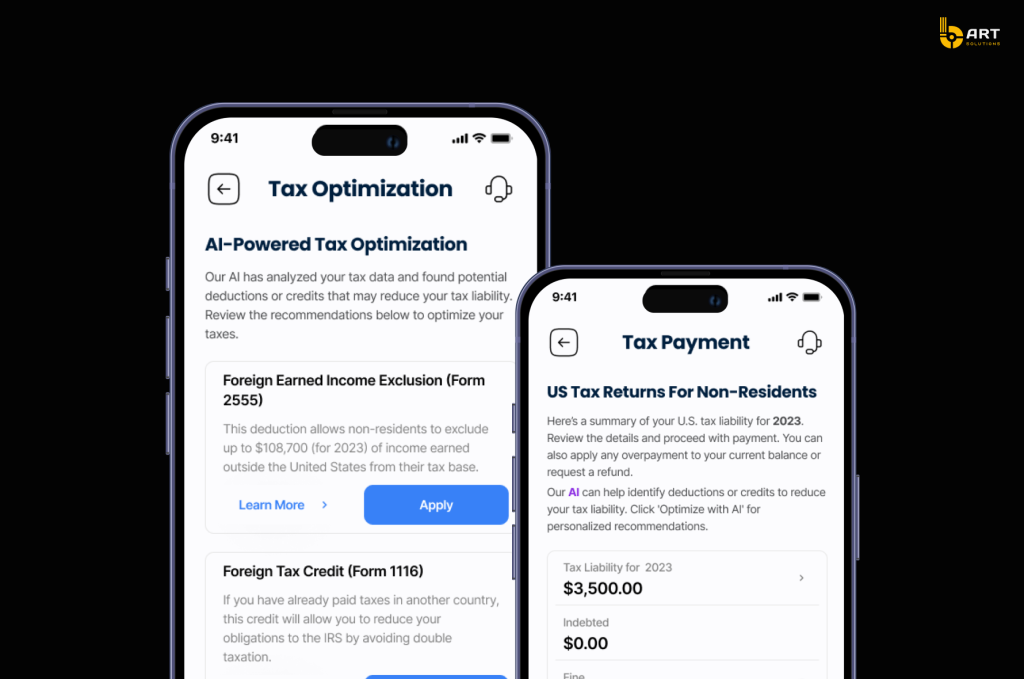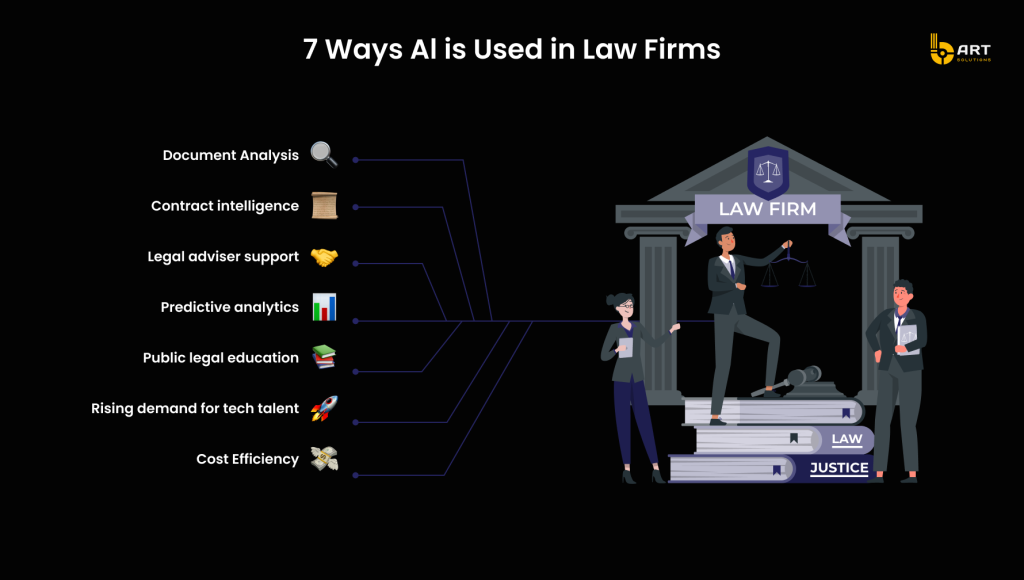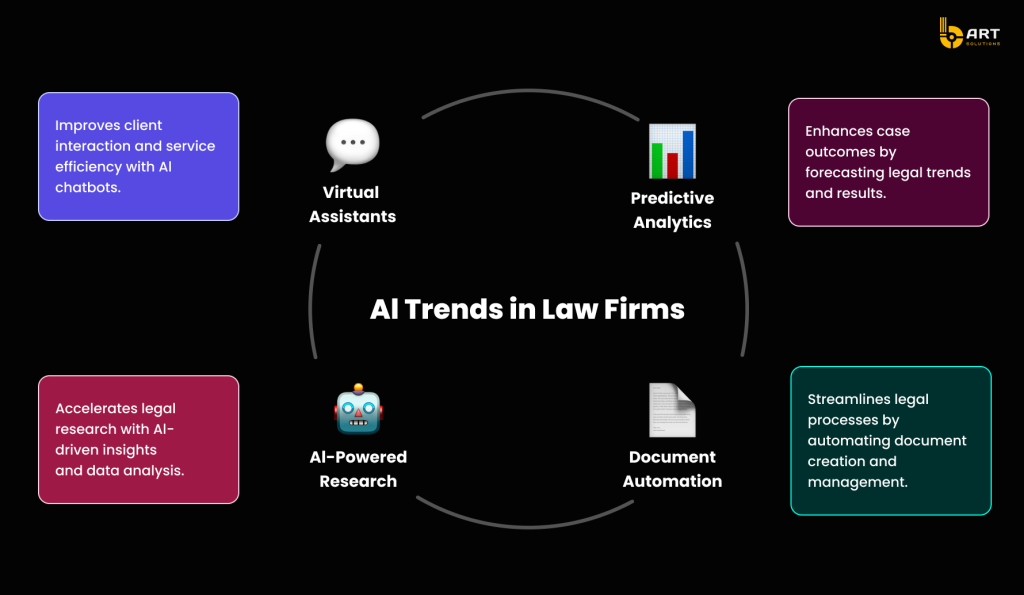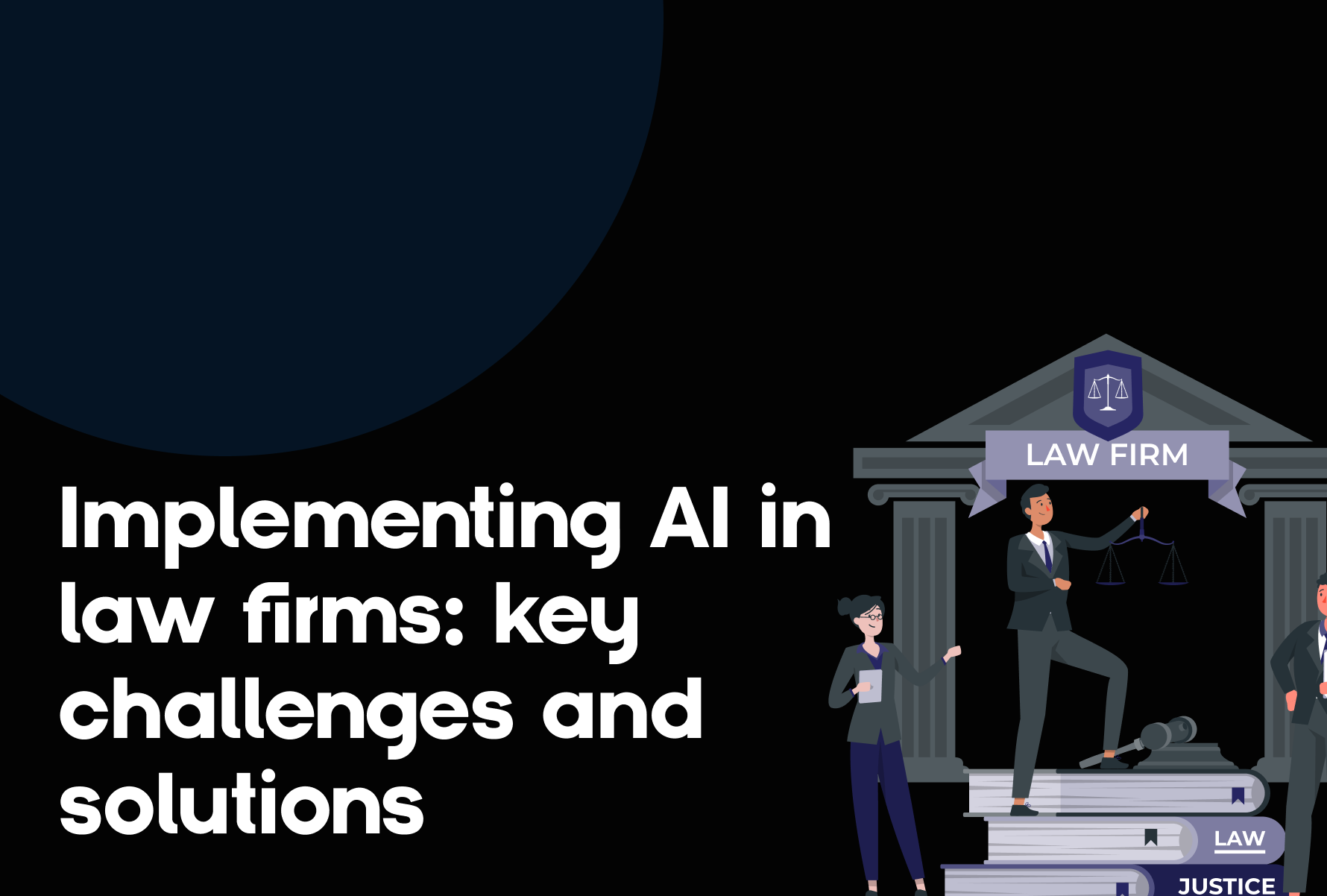By automating repetitive tasks, accelerating research, and improving the accuracy of document reviews, AI offers to take legal services to a new level. In fact, a Thomson Reuters report found that nearly 30% of large legal practices had adopted AI tools, and this number is expected to grow in the future.
Why is there so much buzz behind AI implementation in law firms? On a practical level, legal professionals analyze and handle large volumes of documents and data like contracts, depositions, statutes, and case law, all while facing tight deadlines. AI-driven legal technology helps attorneys sift through these materials with speed and accuracy. However, transitioning to such technology may involve potential risks and pitfalls. It requires implementation of strict data privacy demands, navigating the complexities of integrating new software with legacy systems, addressing skill shortages, and ensuring compliance with legal and ethical standards.
In this blog post, we explore the main challenges businesses face when adopting AI tools in the legal industry, offer suggestions on how to handle these issues, and highlight real-world success stories.
Challenges of implementing AI in legal practices
Data privacy & confidentiality concerns
Every day, lawyers process client records, medical documents, intellectual property filings, and more. Surely, data privacy in legal AI applications must be airtight. The stakes are high: a data breach can compromise privileged communications, damage reputation, and expose clients to serious financial and legal risks.
Growing threat of cyberattacks
According to ABA Cybersecurity Tech Report, 29% of law firms admitted experiencing cyberattacks every year. Considering that AI systems require extensive data to train algorithms, they will likely become prime targets for hackers if not properly secured.
Regulatory & client pressures
Multiple jurisdictions enforce stringent regulations around data handling. In the European Union, the General Data Protection Regulation (GDPR) imposes heavy fines for mishandling or exposing personal data. Similarly, U.S. states like California have introduced data protection laws (e.g., CCPA). Clients themselves often demand strict data safeguarding measures, expecting law firms to uphold the highest standards of legal AI ethics and compliance.
Expert recommendations from bART Solutions
- Encryption & access control: Encrypt data both at rest and in transit, ensuring no unauthorized entity can read the data if intercepted. Restrict who can access the data and keep comprehensive audit logs.
- Anonymized datasets: For training AI models, use anonymized or pseudonymized datasets whenever possible. This reduces the risk of inadvertently exposing personal details.
- Choosing AI vendors: When seeking AI automation for law firms, prioritize providers with proven data security policies, like bART Solutions.
- Ongoing compliance training: Regularly train staff, from interns to senior partners, about the latest threats and best practices. Cybersecurity is as much about people and processes as it is about technology.
Integration with existing systems
Law firms often rely on legacy infrastructure like document management software and billing platforms. Merging these with new AI solutions for legal case management can be complex and expensive.
Legacy platforms & data silos
Many legal systems were built decades ago, lacking modern APIs or standardized data formats. Incorporating AI automation for law firms into such an ecosystem risks data mismatches and operational slowdowns.
Downtime & disruption
Adding or updating systems can disrupt daily workflows if poorly planned. Firms worry that migrating to new technology will reduce billable hours and affect client satisfaction.
Expert recommendations from bART Solutions
- Comprehensive IT audit: Map out every system and how data flows among them. Identify potential conflicts or integration points before implementing AI for legal document review or other solutions.
- Pilot projects: Test the AI solution on limited, low-risk tasks first, like automating simpler contract clauses, before rolling it out across all operations.
- Custom middleware: Sometimes, bridging older software and custom AI solutions for law firms requires reliable middleware. This layer translates data formats and ensures stable communication between systems.
- Professional outsourcing: Legal tech outsourcing providers with experience in system integration can handle complex migrations, minimizing disruption.
Don’t just take our word for it, take a look at one of our latest case studies.

Lack of AI expertise
Law firms excel in legal analysis but not machine learning engineering. The skill gap is sizable: the World Economic Forum’s “Future of Jobs Report” notes that demand for AI professionals exceeds supply by about 30%, especially in specialized domains.
Talent drought
Hiring AI experts is highly competitive. Tech giants and startups offer lucrative packages, making it tough for law firms, especially small and mid-size practices, to attract top data scientists.
Continuous learning curve
AI evolves quickly. Even after onboarding specialists, ongoing training is essential to keep up with new frameworks, ethical guidelines, and regulatory changes around AI and machine learning for legal practices.
Expert recommendations from bART Solutions
- Outsource or partner up: Engage specialized vendors focused on AI-powered legal solutions. Providers like bART Solutions maintain up-to-date expertise, sparing you the cost and effort of building a data science department in-house.
- Targeted internal development: Identify “AI champions” among associates or IT staff and invest in training. This narrower approach yields a small but skilled team that works closely with external partners.
- Academic collaborations: Partner with universities or research labs eager for real-world AI projects. Law firms supply the data sets; researchers offer advanced expertise.
- Industry events & conferences: Attend gatherings like the International Legal Technology Association (ILTA) annual conference to recruit talent, network with vendors, and stay abreast of new tools.
Ethical & regulatory compliance
Attorneys must maintain strict professional and ethical standards. Challenges of AI in the legal industry frequently involve ensuring that newly adopted technologies align with these high stakes.
Risk of algorithmic bias
AI systems learn from historical data. If that data contains bias (e.g., in sentencing guidelines or lawsuit outcomes), the AI could inadvertently perpetuate unfair patterns — an alarming prospect for a profession rooted in justice.
Varying jurisdictional laws
Laws governing AI usage differ from one region to another. For instance, the EU imposes stringent transparency rules under GDPR, while U.S. states each have their own stance on data privacy.
Expert recommendations from bART Solutions
- Comprehensive bias audits: Periodically review AI outputs for signs of bias whether in case predictions or contract analysis. Tools labeled as “explainable AI” (XAI) can help break down the model’s decision-making process.
- Regulatory alignment: Work closely with in-house compliance teams and vendors to ensure legal AI ethics and compliance across different jurisdictions.
- Data diversity: The more representative the data, the less likely the algorithm will skew results. If you’re using outside data sets, vet them carefully for completeness and balance.
- Continual monitoring: Legal regulations around AI will continue to evolve. Employ dedicated staff or external consultants to track new guidelines from bodies like the Federal Trade Commission (FTC) or the European Data Protection Board.
Real-world examples of AI adoption in law
BakerHostetler, a large U.S. law firm with over 900 lawyers, was one of the earliest to deploy an AI tool when it partnered with ROSS Intelligence in 2016. Built on IBM’s Watson, ROSS assists with legal research by sifting through case law and statutes, providing relevant results much more quickly than traditional manual searches could achieve. This allowed BakerHostetler’s attorneys to allocate more time to strategic work rather than laborious text reviews.
DLA Piper, one of the largest law firms in the world, has also successfully embraced AI through its adoption of Kira Systems in 2017. The Kira platform uses machine learning to analyze and extract information from legal documents, a major benefit for mergers and acquisitions due diligence. Internal assessments indicated the firm reduced document review time significantly while lessening human error, enabling attorneys to concentrate on higher-level analysis.
JPMorgan Chase, although a financial institution, has a large in-house legal department tasked with overseeing myriad regulatory and contractual requirements.The bank introduced COiN (Contract Intelligence), an AI system capable of analyzing commercial loan agreements. By automating these reviews, JPMorgan reportedly saved an estimated 360,000 hours of manual legal work each year, demonstrating the profound operational efficiencies AI can deliver.
Why outsourcing remains a strategic option

Given the complexity of AI implementation in law firms, many have found that engaging external specialists delivers a faster, more cost-effective route to success. Outsourcing legal software development with reliable partners like bART Solutions offers the following advantages:
- Specialized skill sets
Outsourcing partners bring immediate expertise in AI and machine learning for legal practices which can be especially beneficial for smaller or mid-sized firms. - Scalable AI solutions for legal services
As case volumes fluctuate, outsourced teams can scale up or down quickly. You aren’t locked into permanent hires or expensive data centers. - Cost efficiency
Building and maintaining an in-house AI team can be prohibitively expensive. Benefits of outsourcing AI for law firms include flexible engagement models, like project-based fees, rather than fixed salaries. - Enhanced data security
Reputable providers prioritize data security in legal AI tools, often using internationally recognized security standards and encryption methods to protect client files. - Regulatory compliance assurance
The best legal tech outsourcing vendors stay on top of new rules and guidelines, implementing AI for contract analysis in law or research tools that inherently meet compliance and ethical standards.
Actionable steps for businesses considering AI

- Start with a task
Whether it’s AI for legal research and analysis or contract review, targeting a single high-volume, repetitive task allows a smooth entry into AI adoption. - Assess your infrastructure
Document existing systems, identify integration points, and evaluate whether you need custom middleware or incremental tech upgrades. - Implement a pilot phase
Test the waters with a small group of attorneys and a limited data set. Gather feedback, measure results, and refine the approach before rolling out firm-wide. - Choose your partner
If you’re outsourcing AI development for legal firms, verify the vendor’s expertise, security credentials, and track record in legal projects. Resources like Clutch can be very helpful in that. - Ensure ongoing compliance
Stay informed on evolving legal regulations and update your AI systems accordingly.
Conclusion
AI implementation in law firms represents one of the most promising shifts in the legal sector. By leveraging AI in legal services, businesses can enhance the way they handle document reviews, legal research, case management, and contract analysis. The Thomson Reuters report noted that firms with some form of AI automation saw, on average, a 15% increase in billable efficiency.
The challenges of AI in the legal industry are demanding. Data privacy must be watertight in a field where confidentiality is sacrosanct. Integration with legacy systems can prove time-consuming and complicated. Navigating legal AI ethics and compliance adds a layer of complexity, given the profession’s duty to uphold justice and protect client interests.
This is where outsourcing legal software development offers tangible solutions. By engaging with a skilled partner like bART Solutions, law firms benefit from on-demand expertise, scalable AI solutions, and cost efficiencies. External teams can also fortify data security in legal AI tools and ensure alignment with all pertinent regulations, mitigating risks that come with adopting new technology.
